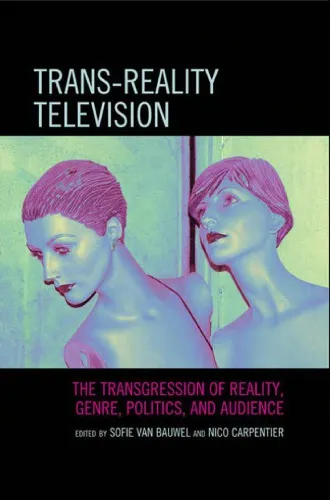Trans-Reality Television: The Transgression of Reality, Genre, Politics, and Audience
3.8
Reviews from our users

You Can Ask your questions from this book's AI after Login
Each download or ask from book AI costs 2 points. To earn more free points, please visit the Points Guide Page and complete some valuable actions.Introduction to "Trans-Reality Television: The Transgression of Reality, Genre, Politics, and Audience"
Television, as a medium, has always played a critical role in shaping cultural, social, and political identities. Over the years, the boundaries between reality and fiction on television have blurred, giving rise to hybrid genres that challenge traditional norms of storytelling and audience engagement. "Trans-Reality Television: The Transgression of Reality, Genre, Politics, and Audience," edited by Sofie Van Bauwel and Nico Carpentier, takes a deep dive into this dynamic interplay of reality and fiction within contemporary television programming.
Through a collection of well-researched essays and case studies, the book explores how reality television disrupts traditional genre conventions, how it influences political narratives, and how audiences interact with these evolving formats. Positioned as a critical and interdisciplinary work, the book not only examines the production and reception processes but also questions the ethical and cultural implications of such transgression into "hyperreality."
Detailed Summary of the Book
The book is divided into thematic sections, each focusing on a core aspect of trans-reality television. Rooted in both media studies theories and practical analyses, the contributors interrogate various television formats, including reality shows, participative media frameworks, and hybrid genres.
One section addresses the interplay of representation and identity in reality television. It examines how these programs shape societal attitudes toward race, gender, class, and sexuality. Another critical area of the book dissects the intersections of politics and participatory media, showcasing how reality television influences political discourse and power dynamics. Case studies of popular reality TV formats—ranging from talent competitions to lifestyle programming—offer concrete examples of these phenomena.
Moreover, the book addresses the audience's perspective, charting the ways in which viewers actively engage with, critique, and appropriate the content within their own socio-cultural contexts. Through these varied lenses, the book delivers a nuanced portrait of how reality television positions itself as a cultural force while constantly redefining its boundaries.
Key Takeaways
- Reality television exemplifies media hybridity, blending fact and fiction to engage viewers in new and often transgressive ways.
- Such programming serves as a cultural text that reveals societal values, tensions, and evolving debates around authenticity and commodification.
- Political narratives embedded in reality TV affect audience perceptions of governance, leadership, and activism.
- Audiences are not just passive consumers but active participants who interpret and interact with reality television within their personal and societal contexts.
Famous Quotes from the Book
"Reality television thrives on the transgression of boundaries, not only between fact and fiction but also between the public and private spheres."
"The political power of reality television lies in its ability to fuse entertainment with engagement, making the ordinary extraordinary."
"The audience's role as co-creator of meaning is the defining feature of contemporary televisual culture."
Why This Book Matters
In an age where the lines between reality and fiction are increasingly blurred, "Trans-Reality Television" provides an essential critical lens to understand the cultural, political, and aesthetic implications of such programming. This book matters because it deeply interrogates how media representations affect not only our perceptions but also our lived realities.
More than just an academic text, this work bridges the gap between theoretical discourse and real-world media consumption. It empowers readers—whether they are scholars, media professionals, or general audiences—to critically evaluate how they engage with television and other forms of media. By examining the transgression of genres and cultural norms inherent in reality television, the book contributes significantly to the ongoing conversation about media ethics, authenticity, and the role of audiences in shaping media landscapes.
"Trans-Reality Television" stands as a foundational text in media studies, offering key insights into the present and future of one of the most influential and controversial forms of televised storytelling.
Free Direct Download
You Can Download this book after Login
Accessing books through legal platforms and public libraries not only supports the rights of authors and publishers but also contributes to the sustainability of reading culture. Before downloading, please take a moment to consider these options.
Find this book on other platforms:
WorldCat helps you find books in libraries worldwide.
See ratings, reviews, and discussions on Goodreads.
Find and buy rare or used books on AbeBooks.
1210
بازدید3.8
امتیاز50
نظر98%
رضایتReviews:
3.8
Based on 0 users review
"کیفیت چاپ عالی بود، خیلی راضیام"
Questions & Answers
Ask questions about this book or help others by answering
No questions yet. Be the first to ask!


